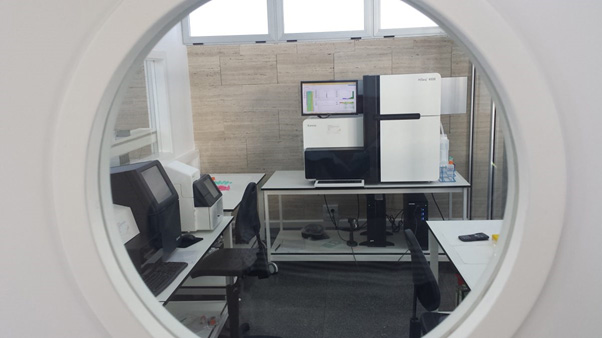Development of a genomic diagnostic unit
Details
Acronym: UDIGEN
Reference: RTC‐2017‐6471‐1
Partners:
- Instituto Tecnológico y de Energías Renovables (ITER) – project’s coordinator
- Universidad de La Laguna (ULL)
- Fundación Canaria de Investigación Sanitaria (FUNCANIS)
Duration: September 2018 – December 2021
Financed budget: 904.828,99 €
Grant: 431.346,30 €
Reimbursable ERDF advance: 80.037,70 €
Loan: 0,00 €
Own contribution: 393.444,99 €
Financing:
- ERDF/ Ministy of Science, Innovation and Universities – Agencia Estatal de Investigación
Retos-Colaboración Call. State Program of Research, Development, and Innovation Oriented to the Challenges of Society. State Plan for Scientific and Technical Research and Innovation 2013-2016. Ministry of Economy and Enterprise (MINECO) of the Government of Spain.
Overview of the project:
The general objective of the UDIGEN project is the development of an integrated genomic analysis platform, from sequencing to interpretation, to facilitate genetic counseling, with the aim of reducing the time between suspicion of genetically caused diseases and a definitive diagnosis.
UDIGEN will carry out its activities based on the experience developed around:
a) a retrospective orthogonal validation study in patients who already have a genetic diagnosis,
b) a population study using reference samples, and
c) a study of patients with evidence of genetically caused diseases.
As a result of this experience, the routine use of exome sequencing is expected to be introduced as a first-line test to support the diagnosis of genetic-based disorders, leading to a reduction in time and costs until a definitive diagnosis is obtained. Additionally, computer tools for management, consultation, and interpretation of genetic variation will be developed, along with their connection to diseases through efficient Big Data analysis procedures.
Key actions and partners
UDIGEN will primarily focus on exome analysis, being the only next-generation DNA sequencing platform with sufficient capacity to perform these genetic analyses in the Canary Islands Autonomous Community.
The project is conceptualized around the supercomputing and massive sequencing infrastructure of ITER, S.A., and is supported by the accredited expertise of collaborating partners, the University of La Laguna (ULL), and the Canary Islands Foundation for Health Research (FUNCANIS), in the development and adaptation of integrated Big Data tools within the platform for analysis and interpretation of human genetic variation.
UDIGEN’s activities will be based on the experience developed around:
- a retrospective orthogonal validation study in patients who already have a genetic diagnosis,
- a population study using reference samples, and
- a study of patients with evidence of genetically caused diseases.
As a result of this experience, the routine use of exome sequencing is expected to be introduced as a first-line test to support the diagnosis of genetic-based disorders, leading to a reduction in time and costs until a definitive diagnosis is obtained. Additionally, computer tools for management, consultation, and interpretation of genetic variation will be developed, along with their connection to diseases through efficient Big Data analysis procedures.


